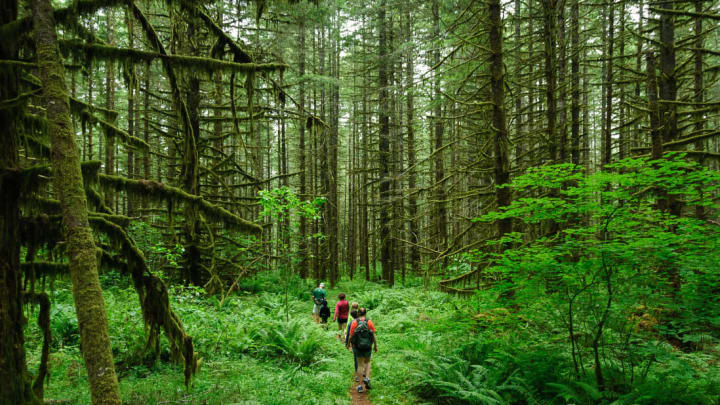After a few months spent indoors with only your family pod for company, you might be craving fresh air, birdsong, and the scent of a pine forest. A new theory called "the Lovebug Effect" suggests there may be a backseat driver in our daydreams of nature holidays and woodland strolls: the gut microbiome.
Humans have an innate tendency to seek out and spend time in natural environments, but we’re still not really sure why. A new paper published in the journal Science of The Total Environment suggests that our thirst for nature could be driven by microscopic life lurking in the deepest, darkest crevices of the gut.
“While it seems clear that we benefit from having the drive to spend time in nature, the exact reasons behind nature-seeking behavior haven’t been resolved,” senior author Martin Breed, a lecturer in biology at Flinders University, tells Mental Floss. “The Lovebug Effect is a conceptual piece that addresses this by drawing from recent work on how microbes influence behavior.”
The human gut is home to trillions of bacteria, fungi, and viruses. Collectively, these microbes make up the gut microbiome, which orchestrates the homeostatic harmony between functions essential to health. Gut-brain communication mediates metabolism, immune system function, and appetite, and could even explain that divine lurch of butterflies in your stomach. The Lovebug Effect theorizes that gut-brain communication also drives nature-seeking behaviors.
“Microbes in a gut environment that are starved of contact with environmental microbiota might be hijacking neural pathways between the brain and gut to drive nature-seeking behavior,” first author Jake Robinson, an ecologist and planetary health researcher at Sheffield University, tells Mental Floss. In other words, your gut microbes are yearning for their outdoor counterparts—and telling your brain to go find them.
There’s now pretty robust evidence from animal studies that microbes can intercept gut-brain crosstalk by activating the vagus nerve and sympathetic neurons through their release of key neurotransmitters, such as serotonin, dopamine, and GABA. Breed says that when the microbiome is lacking in diversity, the chemicals it releases might have an effect on the brain that manifests as a thirst for nature.
Once we're immersed in the great outdoors, we’re literally bombarded by environmental microbiota—a thimble-full of soil contains billions of microbes, far more than there are humans on planet Earth. According to the Lovebug Effect, this abundance of environmental microbiota means our gut microbiome has countless choices when it comes to selecting which microbes to propagate.
And the sensations we experience when immersed in nature offer plenty reason to return. Who doesn’t love the smell of fresh rain? This enticing scent, petrichor, is produced when rain hits bacterial spores in the soil. Breed and Robinson claim that these kinds of sensory preferences could be byproducts of an ancient nature connectedness, and evidence for our co-evolution alongside the microbiome.
Unlike behavior-altering parasites that usually end up killing zombified host animals, gut microbes that stimulate nature-seeking behaviors would also benefit the human host.
Hands-on exposure to soil microbes may boost the immune system, and fresh country air offers a microbial diversity that avoids the accumulation of harmful microbes. Mental health might also benefit; gut microbiome imbalances have been linked to psychiatric disorders, including depression and anxiety.
When starved of natural environments, however, the gut microbiome finds a way to cope. Marco Candela, an associate professor at the University of Bologna, found that gut microbiome imbalances in the isolated crew of the Mars voyage simulation, Mars500, were normalized through a process of “microbial adaptation.” “Reductions in the butyrate-producing bacterium Faecalibacterium prausnitzii were compensated by increases in other butyrate-producing microorganisms,” Candela tells Mental Floss. This means that microbes readily replace the functions of dwindling ones.
Another open question is how altering host behavior would benefit the gut microbiome when the microbes within are competing with each other. “Most animal studies have shown the effect of a single microorganism on behavior, but the gut microbiota is an ecosystem,” Candela says. “It’s a fascinating topic, but needs more confirmation in humans.”
To demonstrate whether the Lovebug Effect is more than speculation, researchers will likely have to examine the relationship between nature connectedness and microbial diversity, and pinpoint the mechanisms underlying microbiome behavioral control.
Other than stimulating curiosity, the Lovebug Effect serves to remind us of our deep-seated connection with the natural world—and that it’s in our best interests to conserve it.
